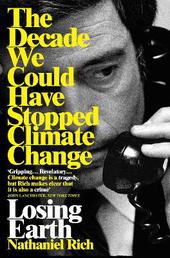
|
Losing Earth: The Decade We Could Have Stopped Climate Change
Paperback / softback
Main Details
| Title |
Losing Earth: The Decade We Could Have Stopped Climate Change
|
| Authors and Contributors |
By (author) Nathaniel Rich
|
| Physical Properties |
| Format:Paperback / softback | | Pages:256 | | Dimensions(mm): Height 198,Width 130 |
|
| Category/Genre | Global warming |
|---|
| ISBN/Barcode |
9781529015843
|
| Classifications | Dewey:363.73874 |
|---|
| Audience | | General | | Tertiary Education (US: College) | | Professional & Vocational | |
|---|
|
Publishing Details |
| Publisher |
Pan Macmillan
|
| Imprint |
Picador
|
| Publication Date |
5 March 2020 |
| Publication Country |
United Kingdom
|
Description
By 1979, we knew all that we know now about the science of climate change - what was happening, why it was happening, and how to stop it. Over the next ten years, we had the very real opportunity to stop it. Obviously, we failed. Nathaniel Rich's groundbreaking account of that failure - and how tantalizingly close we came to signing binding treaties that would have saved us all before the fossil fuels industry and politicians committed to anti-scientific denialism - is already a journalistic blockbuster, a full issue of the New York Times Magazine that has earned favorable comparisons to Rachel Carson's Silent Spring and John Hersey's Hiroshima. Rich has become an instant, in-demand expert and speaker. A major movie deal is already in place. It is the story, perhaps, that can shift the conversation. In the book Losing Earth, Rich is able to provide more of the context for what did - and didn't - happen in the 1980s and, more important, is able to carry the story fully into the present day and wrestle with what those past failures mean for us in 2019. It is not just an agonizing revelation of historical missed opportunities, but a clear-eyed and eloquent assessment of how we got to now, and what we can and must do before it's truly too late.
Author Biography
Nathaniel Rich is the author of the novels Odds Against Tomorrow and The Mayor's Tongue. His short fiction has appeared in McSweeney's, The Virginia Quarterly Review, and VICE, among other publications. He is a writer at large for The New York Times Magazine and a regular contributor to The New York Review of Books and The Atlantic. Rich lives with his wife and son in New Orleans.
Reviews[Rich's] gripping, depressing, revelatory book makes it clear that not only is climate change a tragedy, but that it is also a crime - a thing that bad people knowingly made worse, for their personal gain. -- John Lanchester * New York Times * The excellent and appalling Losing Earth by Nathaniel Rich describes how close we came in the 70s to dealing with the causes of global warming and how US big business & Reaganite politicians in the 80s ensured it didn't happen. Read it. -- John Simpson (on Twitter) Rich brilliantly relates the story of how, in 1979 . . . policymakers [were alerted] to the existential threat, only to see climate treaties fail in a welter of 'profit over planet' a decade later. An eloquent science history, and an urgent eleventh-hour call to save what can be saved. * Nature * To change the future, we must first understand our past, and Losing Earth is a crucial part of that when it comes to the environmental battles we're facing. * Stylist * Others have documented where we are, and speculated about where we might be headed, but the story of how we got here is perhaps the most important one to be told, because it is both a cautionary tale and an unfinished one. -- Jonathan Safran Foer Nathaniel Rich recounts how a crucial decade was squandered. Losing Earth is an important contribution to the record of our heedless age. -- Elizabeth Kolbert [Losing Earth] chronicles the failure of our scientific and political leaders to act to halt the climate apocalypse when they appeared on the verge of doing so, and casts the triumph of denial as the defining moral crisis for humankind. -- Philip Gourevitch Rich demonstrates exquisitely how shallow debate of a deep problem - the planetary scale and civilizational consequences of climate change - exacerbates the problem. -- Stewart Brand A gripping piece of history . . . Rich's writing is compelling . . . Like a Greek tragedy, Losing Earth shows how close we came to making the right choices. * National Public Radio * Nathaniel Rich's account starts in Washington in the 1990s and tells the story of how climate change could have been stopped back then, if only the powerful had acted. But they didn't want to. * Observer *
|